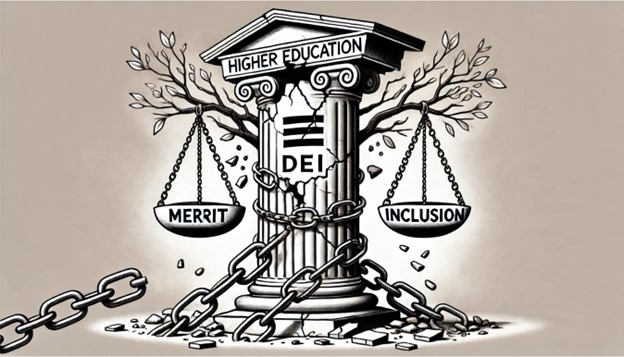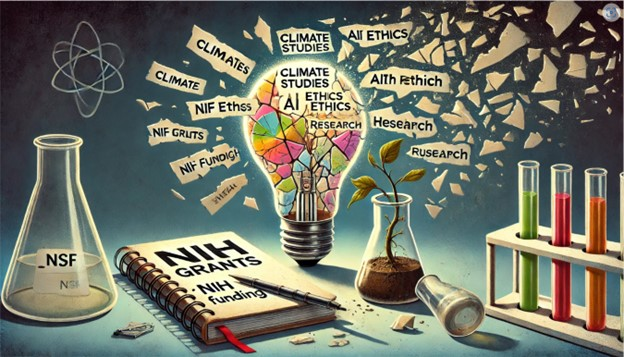The Consequences of Trump's Executive Orders: Scientific Research in Crisis
Input
Modified
The Repression of Diversity and Inclusion of Trump's Policies on Higher Education and Research The Consequences of Trump's Executive Orders: Scientific Research in Crisis International Repercussions: The Effects of Trump's Policies on Global Research

The Repression of Diversity and Inclusion of Trump's Policies on Higher Education and Research
Under President Donald Trump's second term, the United States is undergoing a significant transformation in the fields of education and research. Higher education is being transformed by his administration's aggressive efforts to eliminate diversity, equity, and inclusion (DEI) programs, scrutinize academic funding, and restrict race-based policies. International partnerships and global academic mobility are being impacted by the fallout, which is extending beyond U.S. borders and effecting federally funded research, student admissions, and scholarships.
The Trump administration has initiated investigations into over 50 universities for alleged racial discrimination as part of a comprehensive campaign to dismantle DEI initiatives. The Department of Education issued a warning to institutions that they may lose federal funding if they participate in "race-based preferences" in any aspect of student life, including admissions and scholarships. Reinforcing the administration's steadfast opposition to DEI policies, Education Secretary Linda McMahon declared that pupils should be evaluated on the basis of merit rather than race.
The PhD Project, a nonprofit initiative that aims to enhance diversity in business education by providing assistance to students from underrepresented backgrounds, is one of the primary targets of these investigations. The Department of Education claims that universities that are collaborating with this initiative are engaging in "race-exclusionary practices." This accusation is currently being faced by institutions such as Yale, Cornell, Duke, MIT, Arizona State, and Ohio State. Some universities have already initiated the process of distancing themselves from DEI programs. The PhD Project will no longer receive financial support from Arizona State University or permit faculty members to attend its conferences. Other institutions, such as Ohio State, assert that their programs are accessible to all applicants and do not indulge in racial discrimination. Furthermore, the University of Alabama, the University of South Florida, the University of Oklahoma at Tulsa, Ithaca College, and the New England College of Optometry are all under investigation for providing scholarships based on race. Additionally, the University of Minnesota is under investigation for purportedly conducting a student program that prioritizes racial segregation.

The Consequences of Trump's Executive Orders: Scientific Research in Crisis
The impact of Trump's extensive executive orders has been far-reaching, affecting not only university admissions and student funding, but also the suspension or termination of federally funded scientific research. Among other agencies, the National Science Foundation (NSF) and the National Institutes of Health (NIH) have been directed to cease funding for research programs that pertain to gender studies, climate change, green energy, and DEI. The consequences for researchers have been catastrophic. While federal agencies determine how to comply with the executive orders, numerous individuals have either had their grants terminated or are unable to access previously approved funding. Scientists are dubious as to whether their projects will continue to receive financial support following the suspension of grant review panels by the National Science Foundation (NSF) and the National Institutes of Health (NIH). A doctoral student at Northwestern University, whose research is supported by the National Science Foundation (NSF), expressed apprehension regarding the timely completion of their Ph.D. They stated, "I am unable to complete my data collection and am uncertain about my ability to continue my research in the absence of funding."
Universities have been compelled to seek guidance due to the ambiguity surrounding these mandates. Certain institutions are concerned that research concerning racial disparities in health, AI ethics, or disease development in marginalized communities may be classified as DEI-focused, rendering it ineligible for funding. Mia McIver, the executive director of the American Association of University Professors, cautions that these executive orders are intended to instill dread and compliance among academic institutions, "commandeering the educational mission of colleges by intimidating faculty, staff, and students." The termination of the Cultural and Academic Research Experience (CARE) program at Northern Arizona University (NAU) is one of the most direct consequences of Trump's assault on DEI-related research. Underrepresented high school students were afforded opportunities in STEM disciplines through the NIH-funded initiative. The funding was reduced in accordance with Trump's executive order on "Ending Radical and Wasteful Government DEI Programs," as confirmed by Naomi Lee, the program's director. Lee maintained his commitment to the program, despite these obstacles, by pursuing alternative funding sources. Additionally, researchers in apparently unrelated fields are also being impacted. Ben Stone, a plant genome researcher at the University of South Carolina, observed that his NSF-funded fellowship has been designated as an archived opportunity, which implies that it may no longer receive funding. Many scientists are concerned that the expansive language of Trump's orders could result in the disqualification of their research, even if it does not explicitly address DEI.

International Repercussions: The Effects of Trump's Policies on Global Research
Domestic researchers are not the only ones directly affected by Trump's policies; they are also disrupting international academic partnerships. The U.S. government has administered a 36-question survey to Australian researchers who are involved in U.S.-funded projects. This procedure is known as ideological screening. The questionnaire, which was distributed to researchers at a minimum of eight Australian universities, requests confirmation that their research does not involve DEI, gender studies, or climate change, and that their institutions have not received funding from China, Russia, Cuba, or Iran. Additionally, the survey includes politically contentious inquiries regarding anti-Christian bias, border security, and terrorism.
The survey has been criticized by the Group of Eight (Go8), which represents Australia's top research universities, as "blatant foreign interference." The survey has revealed that six of its eight member universities have already had their research grants suspended or terminated. The Australian government is presently in discussions with U.S. officials to clarify the future of these partnerships, and the Australian Academy of Science has also expressed concerns. European nations and Canada are leveraging the opportunity to recruit displaced U.S. scientists in addition to Australia. South Korea and Canada are actively marketing themselves as more stable options for scientific study, while the European Union has initiated initiatives to provide safe havens to researchers. Some scientists in the United States are already contemplating their departure, and experts have cautioned that this brain leakage could undermine American research and innovation.
The Trump administration's anti-DEI agenda and restrictions on scientific research funding have resulted in international repercussions, institutional resistance, and legal battles. Many higher education institutions are being compelled to reduce diversity programs and eliminate race-conscious scholarships as a result of the increased federal scrutiny they are facing. Many federally funded projects are losing funding as a result of imprecise and politically motivated restrictions, which are a threat to scientific research. The political scrutiny of researchers for U.S. funding is having a significant impact on international academic partnerships, particularly in countries such as Australia. The United States' global scientific influence could be weakened as a result of a potential exodus of American scientists, which could bolster research in Europe, Canada, and other nations. The long-term consequences of these policies are uncertain, as researchers are frantically seeking alternative funding and legal challenges are increasing. Nevertheless, it is evident that the Trump administration's assault on scientific research and DEI is altering the future of American education and global academic collaboration in unprecedented ways.





















